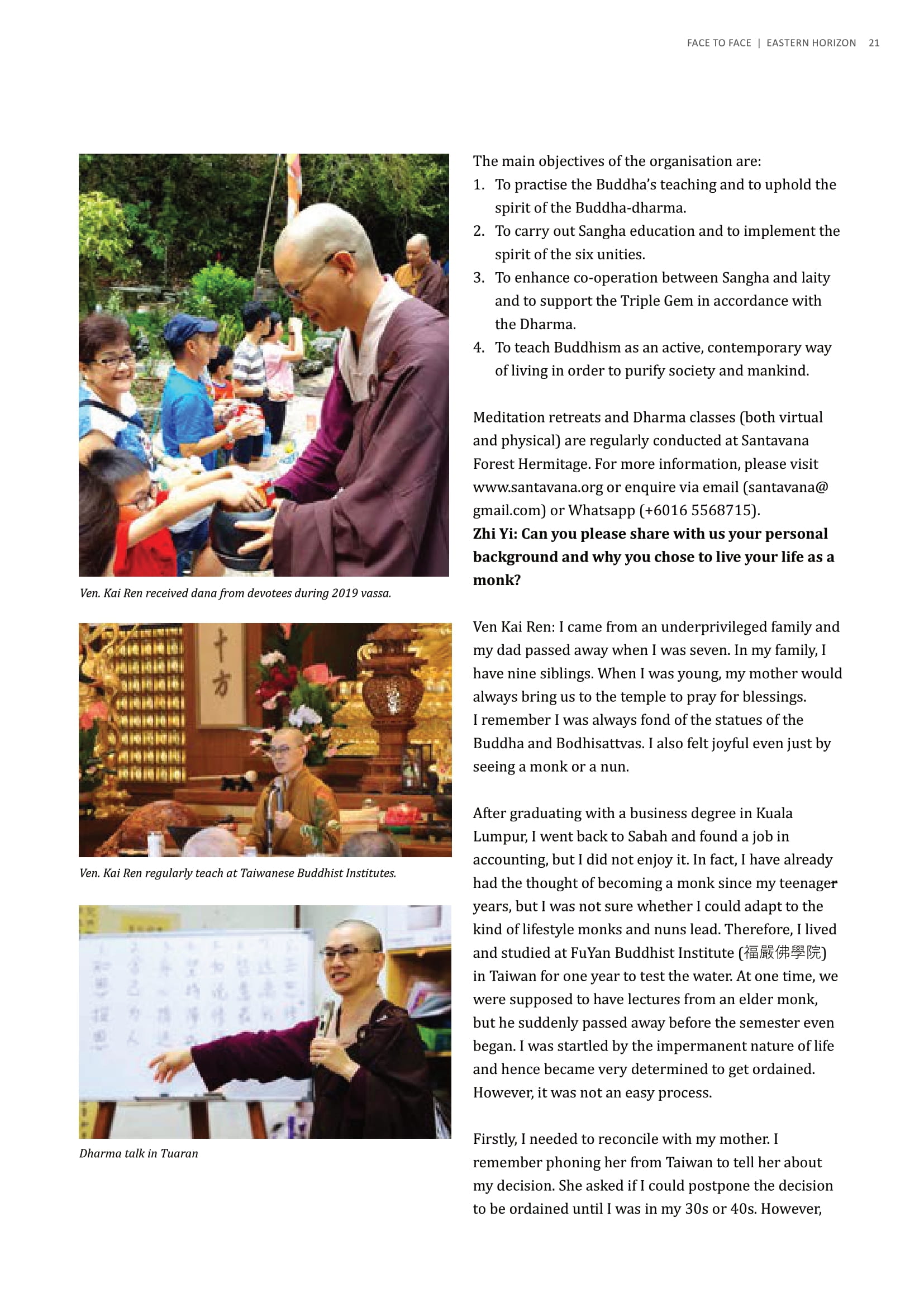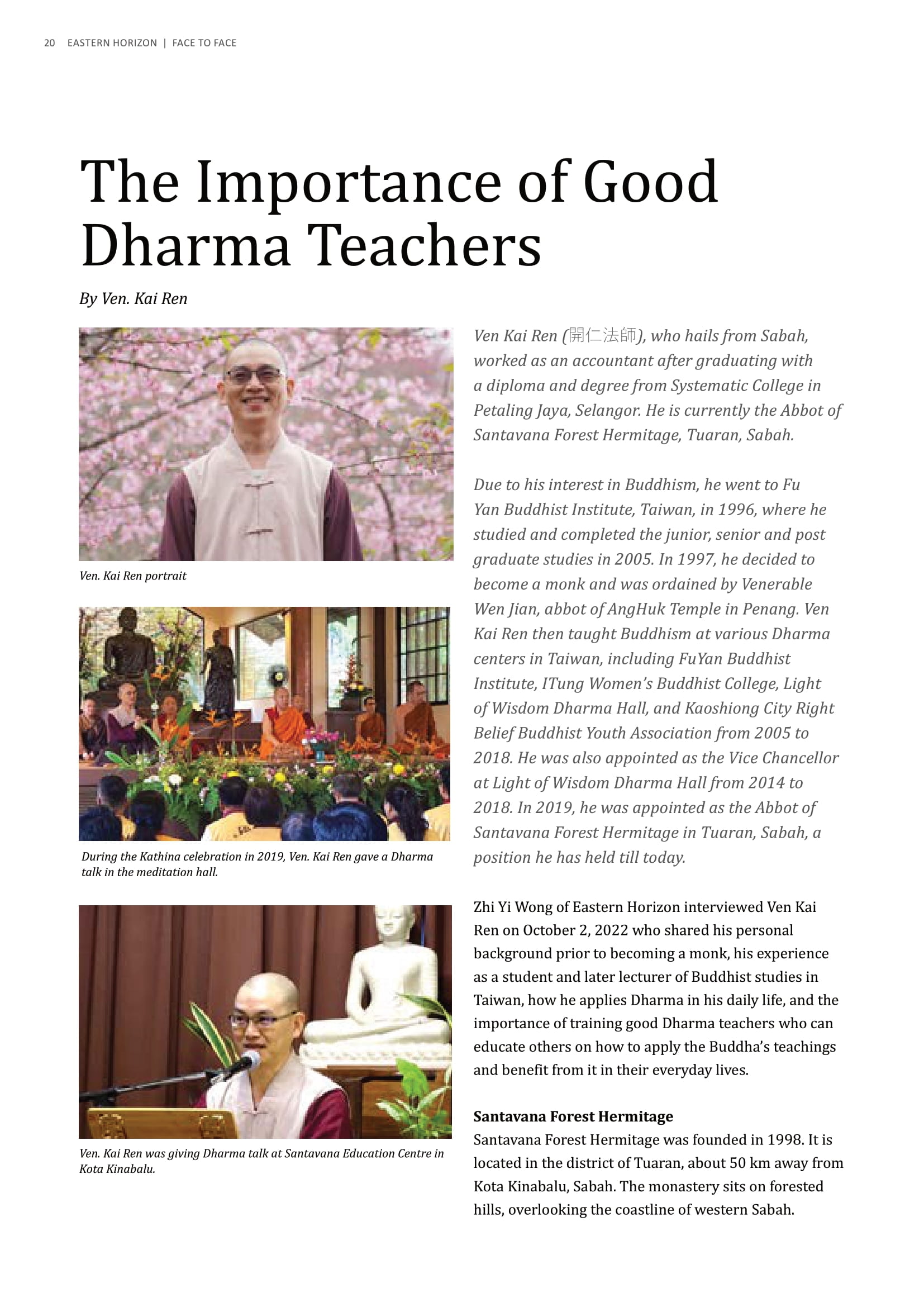Thera Kairen, The Abbot of Santavana Forest Hermitage, was interviewed by Zhi Yi Wong of Eastern Horizon on October 2, 2022, regarding the topic of “The importance of Good Dharma Teachers”. The article is published in Eastern Horizon issue no.69, as shown below.
Ven Kai Ren (開仁法師), who hails from Sabah, worked as an accountant after graduating with a diploma and degree from Systematic College in Petaling Jaya, Selangor. He is currently the Abbot of Santavana Forest Hermitage, Tuaran, Sabah.
Due to his interest in Buddhism, he went to Fu Yan Buddhist Institute, Taiwan, in 1996, where he studied and completed the junior, senior and post graduate studies in 2005. In 1997, he decided to become a monk and was ordained by Venerable Wen Jian, abbot of AngHuk Temple in Penang. Ven Kai Ren then taught Buddhism at various Dharma centres in Taiwan, including FuYan Buddhist Institute, ITung Women’s Buddhist College, Light of Wisdom Dharma Hall, and Kaoshiong City Right Belief Buddhist Youth Association from 2005 to 2018. He was also appointed as the Vice Chancellor at Light of Wisdom Dharma Hall from 2014 to 2018. In 2019, he’s appointed as the Abbot of Santavana Forest Hermitage in Tuaran, Sabah, a position he has held till today.
Zhi Yi Wong of Eastern Horizon interviewed Ven Kai Ren on October 2, 2022 who shared his personal background prior to becoming a monk, his experience as a student and later lecturer of Buddhist studies in Taiwan, how he applies Dharma in his daily life, and the importance of training good Dharma teachers who can educate others on how to apply the Buddha’s teachings and benefit from it in their everyday lives.
Santavana Forest Hermitage
Santavana Forest Hermitage was founded in 1998. It is located in the district of Tuaran, about 50 km away from Kota Kinabalu, Sabah. The monastery sits on forested hills, overlooking the coastline of western Sabah.
The main objectives of the organisation are:
- To practise the Buddha’s teaching and to uphold the spirit of the Buddha-dhamma.
- To carry out Sangha education and to implement the spirit of the six unities.
- To enhance co-operation between Sangha and laity and to support the Triple Gem in accordance with the Dhamma.
- To teach Buddhism as an active, contemporary way of living in order to purify society and mankind.
Meditation retreats and Dharma classes (both virtual and physical) are regularly conducted at Santavana Forest Hermitage. For more information, please visit www.santavana.org or enquire via email (santavana@gmail.com) or Whatsapp (+6016 5568715)
Zhi Yi: Can you please share with us your personal background and why you chose to live your life as a monk?
Ven Kai Ren: I came from an underprivileged family and my dad passed away when I was seven. In my family, I have nine siblings. When I was young, my mother would always bring us to the temple to pray for blessings. I remember I was always fond of the statues of the Buddha and Bodhisattvas. I also felt joyful even just by seeing a monk or a nun.
After graduating with a business degree in Kuala Lumpur, I went back to Sabah and found a job in accounting, but I did not enjoy it. In fact, I have already had the thought of becoming a monk since my teenager years, but I was not sure whether I could adapt to the kind of lifestyle monks and nuns lead. Therefore, I lived and studied at FuYan Buddhist Institute (福嚴佛學院) in Taiwan for one year to test the water. At one time, we were supposed to have lectures from an elder monk, but he suddenly passed away before the semester even began. I was startled by the impermanent nature of life and hence became very determined to get ordained. However, it was not an easy process.
Firstly, I needed to reconcile with my mother. I remember phoning her from Taiwan to tell her about my decision. She asked if I could postpone the decision to be ordained until I was in my 30s or 40s. However, my monastic brother Ven. Kai Yin (開印法師) advised that it was best to be ordained sooner rather than later. Secondly, it was not easy to persuade my teacher Venerable Wen Jian (文建長老) to ordain me because I had not been living in AngHuk Temple (洪福寺). There was not a precedent of ordaining someone who had not spent time in the temple. He even discussed this matter with each monastic brothers and sent Ven. Kai Ti (開諦法師) to Sabah to meet my family so that my background can be thoroughly examined. Ven. Kai Yin also helped explain to my mother what I would be doing as a monastic and that being ordained as a monk did not mean I would cut off my contact with them. Eventually, she was relieved and became supportive of my decision, though many tears were shed.
Zhi Yi: What are your main methods of practicing the Dharma? Are you particularly adept at any of the sūtras or shastras?
Ven Kai Ren: I am more comfortable with Ānāpānasati meditation and counting my breath. I also do loving kindness meditation (mettā) sometimes. I have recently learnt about the four foundations of mindfulness (satipaṭṭhāna) and I am starting to observe the four elements (earth, water, fire and wind) as well as my feelings and mind.
I would not say that I am an expert in any sūtra or shastra but I do have deep interests in The Treatise on the Great Perfection of Wisdom by Nagarjuna and discourses in the Saṃyukta Āgama. I also enjoy studying books written by Ven. Yin Shun (印順導師).
Zhi Yi: What is your biggest reward while teaching in Buddhist Institutes?
Ven Kai Ren: Being a teacher, I think I reaped more benefits as compared to when I was a student because I needed to thoroughly understand the teachings before commenting and interpreting them. With in-depth thinking and comprehension, I translate the ancient words of the Buddha and Buddhist scholars into words that the students can easily understand. This makes me appreciate the Dharma even more.
Zhi Yi: How do you practice the Dharma in your busy daily life?
Ven Kai Ren: I mainly try to establish and maintain right awareness and right mindfulness throughout the day. To help adjusting myself in this busy schedule, I always clear my diary for three days during the week so that I could do some meditation practice and clear my mind. This helps to prevent my mind from constantly seeking out and causing disturbance and restlessness.
Zhi Yi: How do you deal with your negative emotions?
Ven Kai Ren: I am only an ordinary monk. Therefore, it is very normal to encounter negative emotions in my daily life. However, if I compare myself to the time before I was ordained, my ability to sense and become aware of these negative emotions has massively improved. I am able to conquer and tame my negative emotions more rapidly.
It is very important to build resilience during the time when you are calm so that you would not be blown away during stormy days. I regularly learn and contemplate the Dharma, and I would sometimes do some relaxation exercises and walking meditation to settle my inner turmoil. I try my best not to cause negative influence on people but as you know, it is very difficult, because we see people day in and day out. If I have caused distress to others, I will apologise, mediate, and make peace with that person.
Zhi Yi: You have spent many years in Taiwan where you have established yourself as a Buddhist lecturer but why did you decide to return and serve in Malaysia?
Ven Kai Ren: Ven. Kai Yin had established Santavana Forest Hermitage and had been its abbot for over twenty years. He wanted to spend some quiet time in retreat and recuperate. He is my elder monastic brother, and like a teacher to me. I could not bear to see him being exhausted. Besides, I had been teaching in various Buddhist Colleges in Taiwan for over ten years, so I thought I should give myself an opportunity to come out of my comfort zone and learn something different. So, I took up the role as the abbot of Santavana in 2019. Santavana’s board of trustees understand that I have a special connection to Taiwan, hence has allowed me to travel between Taiwan and Malaysia often, so that I can continue propagating the Dharma in different places. Although I am not in the monastery all the time, everyone seems to work together seamlessly, and the temple is being managed smoothly.
Zhi Yi: Which sūtras or shastras would you recommend to the youths today?
Ven Kai Ren: The teachings of the Buddha are very ancient wisdom, and they cannot be interpreted as one wishes. If we were to introduce these ancient teachings to our youth today, we need to deliver them in ways that they can accept and relate. After all, Dharma is not a kind of special knowledge; it is the wisdom that can liberate us from suffering.
The Dhammapada and stories from the Āgamas would be a very good start because the contents are very concise and the wisdom can easily be applied. I would also recommend ‘The Way to Buddhahood’ by Ven. Yin Shun and ‘In the Buddha’s Words: An Anthology of Discourses from the Pali Canon’ by Bhikkhu Bodhi.
Zhi Yi: How can we reach out so that more people can benefit from the wisdom and compassion of the Buddha?
Ven Kai Ren: To achieve this goal, we must be able to demonstrate to people that they can apply the Dharma in their daily lives and benefit from it. However, we cannot just focus on getting higher number of participants to join our activities. Therefore, the quality of Dharma teachers is extremely important. They need to establish the right view and have a robust foundation of sūtras and shastras. When one has grasped the core values of the Dharma, then only he or she can translate the timeless teachings of the Buddha into something relevant in the contemporary world. There are many examples and analogies in the sūtras and shastras which are very applicable in our daily lives.
There can be multiple levels in training our Dharma teachers – beginner, intermediate, and advanced so that we can guide people from all walks of lives in understanding the teaching of the Buddha. In my opinion, training the Dharma teachers is the most important element in making the Dharma more common. One good teacher can inspire ten students and the ten students can go on and bring another hundred students closer to the truth. The Buddha himself used to preach to many leaders and kings because they are the people who can influence the masses. It is important to remember that individual charm does not last. Thus, we should put in more resources to train the Dharma teachers so that Dharma can be propagated to the generations to come.
The abilities of the Dharma teachers are very important because if they lack proper training, they cannot benefit others; at best they can only provide a superficial understanding of the Buddha’s teachings. Therefore, Dharma teachers have to keep striving to improve their practice of Sīla (discipline or ethical living), Samadhi (concentration), and Prajñā (insight or wisdom). In addition, they would have to keep up to date with the latest teaching methods and technologies so that Buddhism remains engaged with the modern world.





